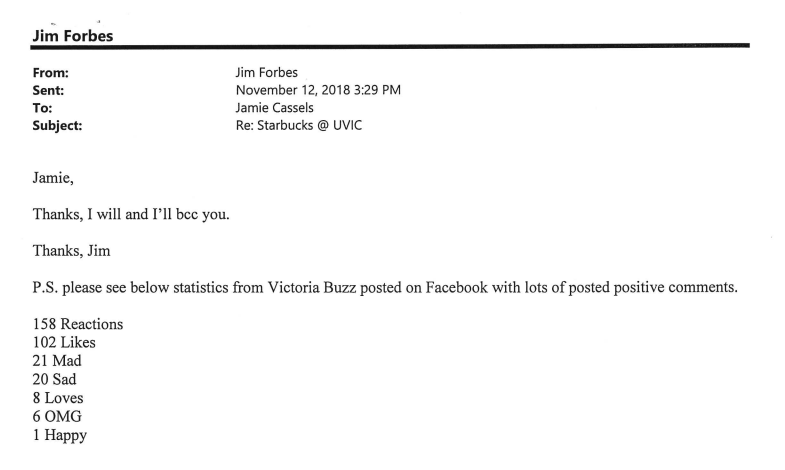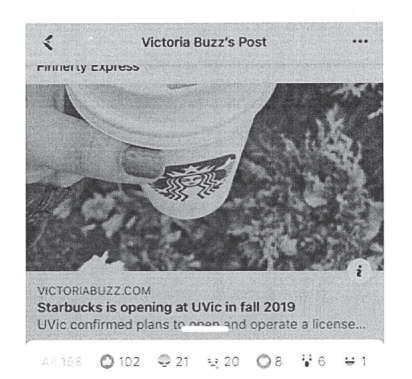Starbucks grievances revealed in Freedom of Information request

Broken hearts, ethical concerns, and presidentially-addressed Facebook reactions — all new information discovered by the Martlet through a Freedom of Information (FOI) request for emails containing the word “Starbucks” sent to and from the University of Victoria’s Director of Food Services Jim Forbes.
Between Nov. 6 and Nov. 20 2018, members of the UVic administration received emails from over 30 alumni, faculty, staff, community members, and students voicing concerns about the university’s decision to replace the campus bookstore coffee shop Finnerty Express with a Starbucks in the fall of 2019.
Most community members expressed concern over fair trade and sustainable practices, the university’s lack of transparency and consultation in this process (UVic later revealed the decision was based off a 2015 survey), and Starbucks’ alleged record of negligence towards human rights.
Background
In November, UVic announced that Starbucks would replace the Finnerty Express Cafe in the basement of the Bookstore.
At the time, a student-led group called “Stop Starbucks UVic” formed in opposition to the arrival of corporate coffee beans to campus. The protest group created a petition and Facebook page, garnering 2 285 signatures and 823 likes respectively.
In light of the announcement and subsequent student activism, the Martlet filed a FOI request to the university later that month. The request was for any and all emails with the word “Starbucks” sent to Jim Forbes, UVic’s Director of Food Services between Feb. 1 2017 and Dec. 1 2018.
According to the British Columbia Freedom of Information and Protection of Privacy Act, public bodies like UVic have 30 business days to respond to requests, although they can take a 30-business day extension if the request is too great and will require more time to acquire information and censor for confidential information.
After exceeding two extensions to this deadline, the FOI was returned on April 8.
Community Response
A professor in the Political Science department (whose name was redacted) emailed to share their knowledge about Starbucks’ problematic sourcing practices, a topic they had recently lectured about for a UVic class.
According to the professor, only about 8.6 per cent of the beans that Starbucks purchases are fair trade certified, and these beans are almost never used in their prepared coffee. Most of the business from the campus Starbucks, the professor said, will be prepared coffee.
“Thus, we can safely assume that none — or almost none — of the coffee they will serve on campus will be fair trade,” the professor said. “If you investigate more closely and compare the company to (coffee) companies that support fair trade and ethical sourcing, then Starbucks does extremely poorly.”
The professor noted, they had checked with an advisor at the Canadian Fair Trade Network to verify that information about the company’s practices available from 2015 was still accurate — only to find that as of early November, Starbucks’ practices had allegedly only deteriorated.
Several emails expressed concerns with how this decision aligned with section 5.3 of UVic’s Strategic Framework regarding dining services.
As per this section, UVic aims “to be an institutional model of sustainability, leading the way through innovative local purchasing initiatives … and provide high quality, ethically sourced, nutritious and diverse food options that sustain the health and wellbeing of our community.”
One email, sent by a UVic employee, outlined several concerns they and other employees had to this effect.
“We are frustrated with this decision, as it promotes the idea that local businesses, human rights, and sustainable food practices are not important to the institution.”
“Many of us believe in [UVic’s] sustainability action plan, and feel strongly that we have a cultural and social responsibility to maintain our standards,” the employee wrote. “Replacing Finnerty Express with Starbucks certainly appears to undermine these efforts.”
An undergraduate student added that they were disappointed in the decision to replace Finnerty — which they cited as local, organic, and affordable — with “an international corporation that operates at a much lower standard, while selling goods at higher prices.”
“This is obviously a step backwards for sustainability and ethically-sourced food on campus,” the student said.
Community members also expressed concern for a lack of consultation in this process. According to information obtained by the Martlet in December, the decision to bring Starbucks to campus was based off a 2015 survey, where 206 individuals — out of 841 members of the UVic community who responded to a question regarding bringing bigger brand names to campus — explicitly requested Starbucks.
“We are frustrated with this decision, as it promotes the idea that local businesses, human rights, and sustainable food practices are not important to the institution,” wrote a UVic alumnus. “Proper consultation is required when making decisions that affect the student body.”
Above all, the common thread of these emails was a sense of mourning for the loss of Finnerty Express.
“Yikes. I cannot describe how disappointing this is to read and hear,” one person emailed Forbes. “Breaks my heart to see my long time “old friend” disappear.”
The university’s reply
All emails sent to UVic administration regarding concerns about Starbucks at this time appear to have been forwarded directly to Forbes, who was also the most frequent direct recipient of these emails — alongside UVic president Jamie Cassels.
Some emails, including the one written by the UVic political science professor, were forwarded to Scott Ahmed and Neena Arora — a Brand Manager and National Account Executive Senior at Starbucks, respectively.
In the messages that Forbes replied to, he expressed that the university is “exploring opportunities” for Salt Spring Coffee and the local bakeries (currently distributing through Finnerty Express) to maintain partnerships on campus by selling their products at the university’s other cafes. Forbes also stated that the new Starbucks would be accountable to all of UVic’s sustainability principles and practices — even promising that it will offer 100 per cent fair trade coffee and tea.
“I can understand that not everyone is supportive of this change, but I have also received incredibly positive feedback,” Forbes said.
The emails acquired by the Martlet do not highlight positive feedback — though that’s not to say there wasn’t any. The only hint to positive feedback in this 215 page FOI was in Forbes’ response to an email forwarded to him by Cassels. In this email, an alumnus challenged the university president to reflect on the negative environmental impact of the Starbucks decision. In his reply to Cassels, Forbes included screenshots of a Victoria Buzz article about the Starbucks announcement.

“Please see the below statistics from Victoria Buzz posted on Facebook with lots of posted [sic] positive comments,” Forbes said, and went on to list each of the reactions. “102 likes, 21 mad, 20 sad, eight loves, six [wow], 1 [haha].”








